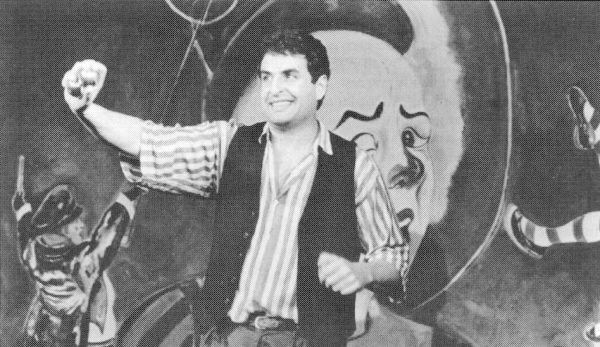
"Father-Land" is an autobiographical journey of family history and personal experience. |
|
Raz at age 18, in clown makeup for the first time, working one of his first jobs as a professional. |
Page 17 Summer 1992
Another
teaching adventure was a special arts program for schools in Alaska
whose mission was to teach circus skills and theater to Eskimo
children and adults in the villages of Yukon \ Kuskokwim Delta. He
will return to Alaska next March to teach in the 400-person village
of St. Michels, and hopes to participate in the Eskimo Olympics. Its
a fair bet that the town will be just a little bit different when he
leaves!
Raz thinks these experiences might have helped him understand people as a director. "As a teacher, you have no real power at all it's the same with directing," he said. "You must be responsible for everything, but you can't just make people do what you want. All you can do is manipulate and cajole. You have to be a real psychologist in order to deal with people effectively."
In
putting together "Father-Land," Raz found his own director,
Jael Weisman, who also co-authored the script. On a rainy Tuesday in
late February, many strange voices could be heard emanating from the
Pickle Family Circus headquarters on Missouri Street. Raz had just
returned from a stint with the Pickles at the Guthrie Theater in
Minneapolis and was in the process of putting the final touches on his
show, set to open the following week in Berkeley. "It's been
difficult arranging the opening longdistance," he said.
"It seems I'm the only one who can organize everything that's
needed, and I was afraid the promoters might cancel it before I
returned."
As
he ran from one errand to another in the hectic days before the
opening, Raz could be heard mumbling various bits of dialogue and
assuming the postures and mannerisms of the show's bizarre cast of
characters, sometimes covering all 15 of them in one block (San
Francisco has some long blocks). When
opening night finally rolled around, an expectant audience awaited the
performance at the Jewish Community Center, although many were not
quite sure what to expect. The play involves events which occured in
Germany during the war, some in concentration camps - risky material
for a Jewish audience.
But
right from the start the audience became engaged in the story, which
begins with Raz's childhood experiences in Brooklyn. He first
encounters his Jewish heritage when a classmate asks him "Did you
kill Christ?" and proceeds to dump tapioca pudding on the
befuddled hero's head as he ponders the question. As Raz commented to
a reviewer earlier in the week, "My background is shtick, and
there had better be a lot of humor in this piece." |

"Father-Land" is an autobiographical journey of family history and personal experience. |
|
Raz at age 18, in clown makeup for the first time, working one of his first jobs as a professional. |